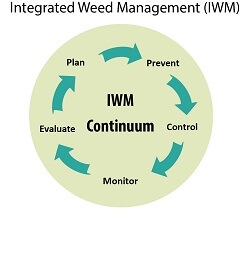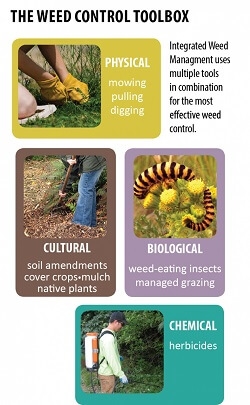Why control noxious weeds in Clark County?
Noxious weeds are non-native plants that can be toxic, destructive, competitive and difficult to control once established.
Economics - Noxious weeds cost the United States on average $30.6 billion each year in decreased land value, money and time spent on control efforts, lower crop yields, reduced forage quality and impacts on animal health.
Environmental health - Noxious weeds displace native species, destroy natural habitat, clog waterways and increase erosion and fire risk.
Human and animal health - Many noxious weeds are toxic to humans and livestock. Contact or ingestion of some species can lead to serious health problems or even death.
Recreation - Noxious weeds hurt recreation opportunities, such as bird watching and fishing, through reduced accessibility and destruction of native landscapes.
Legal - Washington law, RCW 17.10.140, requires landowners to: eradicate Class A noxious weeds , control designated Class B noxious weeds , and control any Class B and noxious Class C noxious weeds that are included in the county’s noxious weed list.
Managing weeds with Integrated Weed Management
The most effective way to manage weed infestations is to use a combination of control methods specific to the problem weed, where it is in its growth-cycle, and the location where it is growing. This approach is called integrated weed management, or IWM, which uses biological, mechanical, cultural, and chemical (herbicide) control methods that treat the problem weed yet protect human health, habitat, water, and other natural resources.
Prevention is better than control - The best control method of all is to prevent weeds in the first place. IWM starts with understanding the soil, water, natural resources and human impacts and uses on a site. For example, weeds often invade due to overgrazing, bare soil, or other factors that should be corrected for the control measures to be fully effective.
Long-term effectiveness – A good IWM plan is more effective than complete reliance on herbicide management. While not all control methods are useful for all weed species, taking an integrated approach to weed management can greatly increase the effectiveness of your efforts. As weed control is not a one-time fix, an IWM strategy should be practical, adaptable, cost-efficient, and effective.
Help stop the spread of noxious weeds
- Report infestations.
- Actively control noxious weeds on your property.
- Contact Clark County Noxious Weed Management for more information on species identification and recommended control methods.
- Spread the word about noxious weeds and why controlling them is important.
Remember, weeds are everyone’s problem. Controlling noxious weeds on your property is your responsibility and the law.

